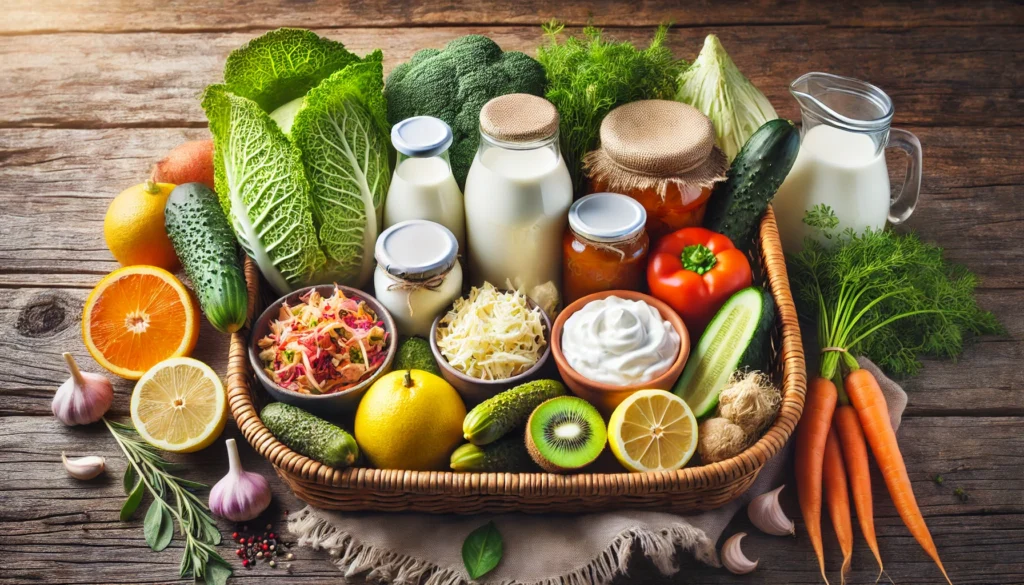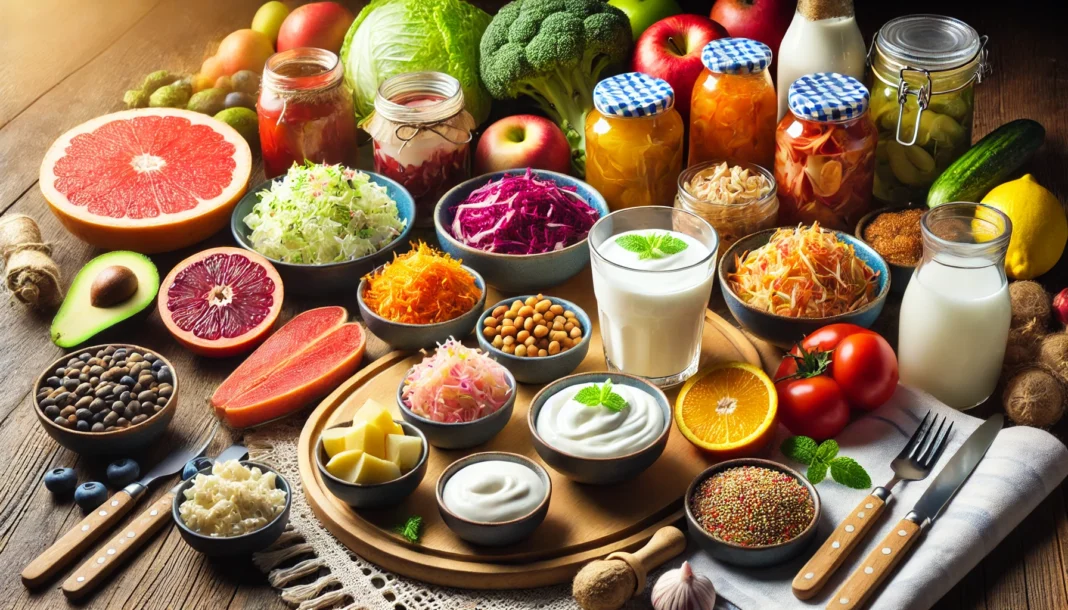Understanding the Role of Probiotics in Weight Loss
The human gut is home to trillions of microorganisms, collectively known as the gut microbiome, which plays a crucial role in digestion, immune function, and overall health. Among these microorganisms, probiotics are beneficial bacteria that help maintain a balanced gut environment. Recent research suggests that probiotics can influence metabolism, appetite regulation, and fat storage, making them valuable for individuals seeking weight loss. The best probiotics for weight loss support gut health by optimizing bacterial diversity and reducing inflammation, factors that contribute to metabolic efficiency. Understanding the complex relationship between probiotics and weight management is essential for those looking to improve their health naturally.
You May Also Like: The Healthiest Foods to Eat Every Day for Optimal Wellness
The Science Behind Gut Health and Metabolism
The gut microbiome consists of various bacterial strains that impact metabolic processes. Some bacterial species promote fat accumulation, while others enhance fat breakdown and energy expenditure. Studies have shown that individuals with obesity often have an imbalance in gut bacteria, characterized by a higher ratio of Firmicutes to Bacteroidetes. This imbalance is associated with increased calorie extraction from food and a propensity for weight gain. The best probiotic for gut health and weight loss works by restoring microbial balance, improving digestion, and modulating hormones that regulate hunger and satiety. Additionally, probiotics contribute to reduced intestinal permeability, preventing the absorption of harmful substances that trigger inflammation and metabolic disorders.
Best Probiotic Strains for Weight Loss
When selecting the best probiotic for belly fat reduction and overall weight management, it is important to consider specific strains that have been scientifically studied for their efficacy. Lactobacillus gasseri is one of the most well-researched strains for reducing abdominal fat, with studies indicating significant decreases in body weight and visceral fat mass. Similarly, Lactobacillus rhamnosus has been linked to enhanced fat metabolism and weight reduction, particularly in women. Bifidobacterium breve has demonstrated potential in improving insulin sensitivity and reducing fat accumulation. These probiotic strains contribute to weight loss by modulating gut bacteria composition, decreasing inflammation, and regulating energy balance. Incorporating these strains into one’s diet through supplements or fermented foods can support sustainable weight management efforts.
Probiotics and Appetite Regulation
Appetite control is a critical component of weight management, and probiotics influence this process through their interaction with gut-derived hormones. Ghrelin, the hunger hormone, and leptin, the satiety hormone, play key roles in determining food intake and energy balance. An unhealthy gut microbiome can disrupt these hormonal signals, leading to overeating and weight gain. The best probiotic for women’s weight loss works by improving the gut-hormone axis, thereby promoting better appetite regulation. Additionally, certain probiotic strains increase the production of short-chain fatty acids (SCFAs), which enhance satiety and reduce caloric intake. This mechanism highlights the importance of maintaining gut health for effective and sustainable weight management.

Can Probiotics Make You Gain Weight?
A common concern is whether probiotics can lead to weight gain instead of weight loss. While most probiotic strains support a leaner body composition, some strains may contribute to weight gain under certain conditions. For instance, some Lactobacillus species, such as Lactobacillus reuteri, have been associated with increased weight in animal studies. However, this effect is context-dependent and influenced by diet, lifestyle, and individual gut microbiota composition. The key to using probiotics effectively for weight management lies in selecting the right strains and ensuring a balanced diet rich in fiber and prebiotics. When used correctly, probiotics do not inherently cause weight gain but rather optimize metabolic function for improved body composition.
The Impact of Probiotics on Inflammation and Fat Storage
Chronic inflammation is a significant factor contributing to obesity and metabolic disorders. An imbalanced gut microbiome can trigger systemic inflammation, leading to insulin resistance and increased fat storage. The best probiotics for weight loss work by reducing gut-derived inflammation through mechanisms such as strengthening the intestinal barrier and modulating immune responses. Certain probiotic strains, like Bifidobacterium longum and Lactobacillus plantarum, have been shown to lower inflammatory markers and improve metabolic health. By addressing inflammation at the gut level, probiotics support a healthier weight and reduce the risk of obesity-related complications such as type 2 diabetes and cardiovascular disease.
Prebiotics and Probiotics: A Powerful Combination for Weight Loss
While probiotics play a crucial role in gut health, their effectiveness is enhanced when combined with prebiotics. Prebiotics are non-digestible fibers that serve as food for beneficial bacteria, promoting their growth and activity. Foods rich in prebiotics include garlic, onions, bananas, asparagus, and chicory root. When consumed alongside probiotics, prebiotics help maintain a thriving gut microbiome, leading to better digestion, improved metabolism, and enhanced weight management. The synergy between prebiotics and probiotics underscores the importance of a diet that supports gut health for long-term wellness and fat loss.
Incorporating Probiotics into Your Daily Routine
To maximize the benefits of probiotics for weight loss, it is essential to incorporate them consistently into one’s diet. Fermented foods such as yogurt, kefir, kimchi, sauerkraut, and miso are excellent natural sources of probiotics. Additionally, high-quality probiotic supplements can provide targeted strains that support metabolism and fat burning. When choosing a supplement, it is important to select one with clinically validated strains and a sufficient colony-forming unit (CFU) count to ensure efficacy. Maintaining a healthy lifestyle, including a balanced diet, regular physical activity, and stress management, further enhances the positive effects of probiotics on weight loss.

Frequently Asked Questions (FAQ) About Probiotics and Weight Loss
1. How do probiotics influence the body’s ability to burn fat?
Probiotics impact fat metabolism by influencing the gut microbiome, which plays a critical role in energy balance and fat storage. Certain probiotic strains, such as Lactobacillus gasseri and Bifidobacterium breve, have been shown to enhance the body’s ability to break down fats while reducing the storage of excess adipose tissue. The best probiotics for weight loss optimize the production of short-chain fatty acids (SCFAs), which help regulate energy expenditure and fat oxidation. Additionally, probiotics can improve insulin sensitivity, making it easier for the body to utilize glucose rather than storing it as fat. Over time, consistent probiotic intake supports a healthier metabolic rate and facilitates sustained fat loss.
2. What makes a probiotic effective for reducing belly fat?
Not all probiotics contribute to fat reduction, but some strains are particularly beneficial for targeting abdominal fat. The best probiotic for belly fat works by modulating gut bacteria to decrease inflammation and regulate fat storage hormones such as leptin and ghrelin. Strains like Lactobacillus rhamnosus and Bifidobacterium lactis have been associated with reductions in visceral fat, the type of fat stored around internal organs that is linked to metabolic disorders. These probiotics also help maintain a healthy gut barrier, preventing lipopolysaccharides (LPS) from entering the bloodstream and triggering fat accumulation. A diet rich in fiber and fermented foods can enhance the effectiveness of probiotics in reducing belly fat.
3. Can probiotics improve digestion in ways that support weight loss?
Yes, probiotics improve digestive efficiency, which can have a direct impact on weight management. The best probiotic for gut health and weight loss supports the breakdown and absorption of nutrients, preventing bloating, constipation, and sluggish digestion. A well-balanced gut microbiome facilitates regular bowel movements, reducing water retention and excess waste buildup. Additionally, probiotics can enhance bile acid metabolism, which plays a role in fat emulsification and digestion. When digestion functions optimally, the body is less likely to store excess calories as fat, making weight loss efforts more effective.
4. What is the connection between probiotics and appetite control?
Probiotics influence appetite by regulating hormones that control hunger and fullness. The best probiotic for women’s weight loss can enhance leptin sensitivity, which signals the brain when enough food has been consumed, reducing the likelihood of overeating. Additionally, probiotics stimulate the production of SCFAs, which influence the release of gut peptides such as peptide YY (PYY) and glucagon-like peptide-1 (GLP-1), both of which promote satiety. A balanced gut microbiome reduces cravings for high-calorie, sugary foods by maintaining stable blood sugar levels. These mechanisms contribute to long-term appetite control and more sustainable eating habits.
5. Do probiotics make you gain weight in certain cases?
While probiotics are typically associated with weight loss, some strains can contribute to weight gain under specific conditions. Strains such as Lactobacillus reuteri have been linked to increased weight in certain animal studies, particularly when combined with a high-calorie diet. However, whether probiotics make you gain weight depends on individual microbiome composition and dietary habits. If an individual consumes excessive calories while taking probiotics, weight gain may still occur. Selecting the best probiotics for weight loss and maintaining a balanced diet is key to achieving optimal results.
6. How do probiotics affect inflammation and its role in obesity?
Chronic inflammation is a major factor in obesity, as it disrupts metabolic function and promotes fat accumulation. Probiotics help reduce inflammation by strengthening the gut barrier and preventing the release of inflammatory toxins into the bloodstream. The best probiotic for gut health and weight loss contains strains like Bifidobacterium longum and Lactobacillus plantarum, which lower inflammatory markers such as C-reactive protein (CRP). By decreasing inflammation, probiotics support a healthier metabolism, making it easier to lose weight and prevent metabolic disorders. This anti-inflammatory effect also reduces the risk of insulin resistance, which can lead to obesity and related health issues.
7. Can probiotics enhance the effectiveness of exercise for weight loss?
Yes, probiotics can enhance exercise performance and recovery, contributing to more effective weight loss. The best probiotic for belly fat reduction improves gut health, allowing for better nutrient absorption and energy production. Probiotics also support muscle function by reducing exercise-induced inflammation and oxidative stress. Some research suggests that probiotic supplementation can increase endurance and decrease fatigue, helping individuals maintain a consistent workout routine. Additionally, probiotics may aid in protein synthesis and muscle repair, ensuring that exercise efforts translate into improved body composition over time.
8. How can women benefit specifically from probiotics for weight loss?
Women often experience hormonal fluctuations that affect weight management, and probiotics can help regulate these hormonal shifts. The best probiotic for women’s weight loss supports gut bacteria diversity, which is essential for balancing estrogen and progesterone levels. Probiotics can also reduce symptoms of bloating and water retention associated with menstrual cycles and menopause. Additionally, some strains, such as Lactobacillus rhamnosus, have been found to be particularly effective in promoting fat loss in women compared to men. A well-balanced gut microbiome enhances metabolism and energy levels, making it easier for women to maintain an active lifestyle and achieve their weight loss goals.
9. What role do prebiotics play in enhancing probiotic effectiveness for weight loss?
Prebiotics serve as fuel for probiotics, allowing beneficial bacteria to thrive and multiply in the gut. The best probiotics for weight loss work more effectively when paired with prebiotic-rich foods such as bananas, garlic, onions, and asparagus. Prebiotics enhance the production of SCFAs, which play a key role in fat metabolism and appetite regulation. They also help probiotics colonize the gut more efficiently, leading to longer-lasting benefits for digestion and weight management. Incorporating both prebiotics and probiotics into a daily routine maximizes gut health benefits and supports sustained fat loss.
10. Can probiotics help with long-term weight maintenance?
Yes, probiotics play a significant role in preventing weight regain after weight loss. The best probiotic for gut health and weight loss supports a balanced microbiome, which helps maintain metabolic efficiency even after a calorie deficit. Studies suggest that individuals who continue probiotic supplementation after losing weight are less likely to experience rebound weight gain. Probiotics help regulate inflammation, appetite hormones, and digestion, all of which are key factors in long-term weight stability. Consistently consuming probiotic-rich foods or supplements, along with a healthy diet and active lifestyle, provides lasting benefits for weight management and overall well-being.

Final Thoughts: Harnessing Probiotics for Effective Weight Management
Probiotics offer a promising and natural approach to weight management by supporting gut health, metabolism, and appetite regulation. The best probiotic for gut health and weight loss includes strains that balance the gut microbiome, reduce inflammation, and optimize digestive processes. While probiotics alone are not a magic solution for weight loss, they play a critical role in creating a healthy internal environment that facilitates fat burning and metabolic efficiency. By incorporating probiotics into a comprehensive weight loss strategy that includes a nutritious diet, regular exercise, and stress reduction, individuals can achieve sustainable results. Understanding the intricate connection between gut health and body weight empowers individuals to make informed choices that support long-term well-being and a healthier lifestyle.
gut microbiome balance, digestive health support, weight management supplements, probiotics for metabolism, healthy gut flora, natural fat burners, gut-friendly diet, beneficial bacteria for digestion, fermented foods for weight loss, microbiome and metabolism, gut-brain connection, probiotics for inflammation, insulin sensitivity improvement, prebiotics and probiotics synergy, best strains for digestion, healthy digestion tips, probiotics for bloating relief, gut health and immunity, natural appetite control, optimizing gut bacteria
Further Reading:
Use of probiotics in preventing and treating excess weight and obesity. A systematic review


